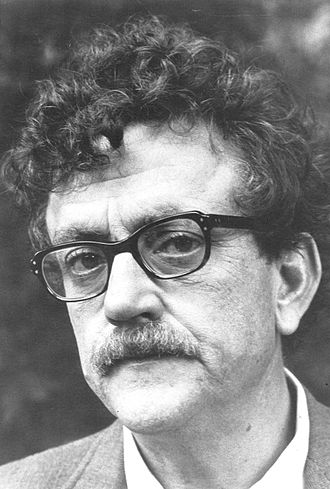
Most of us know Kurt Vonnegut from his science fiction classics, such as “Slaughterhouse Five” and “Player Piano.” But his fame as a commencement speaker almost overshadowed his fame (notoriety?) as a shrewd and caustic master of fiction. As Maria Popova illustrates in her review of “If This Isn’t Nice, What Is?,” Vonnegut’s collected commencement addresses, the author generously shared not only his hard-won wisdom, but also his stubborn optimism.
At the heart of Vonnegut’s talks, as in his fiction, is the urgent warning that we’re in danger of losing our humanity. We lose it, he says, by isolating and distracting ourselves. As Popova writes:
This, in fact — this passionate advocacy for the value of community, of finding your tribe — is something Vonnegut reiterates across his many commencement speeches. In another address, he, the father of seven children, argues that the modern family is simply too small, leaving too much room for loneliness and boredom, and advises: “I recommend that everybody here join all sorts of organizations, no matter how ridiculous, simply to get more people in his or her life. It does not matter much if all the other members are morons. Quantities of relatives of any sort are what we need.”
Vonnegut often preached the gospel of art, including music, theater, and literature as a catalyst for emotional and social well-being. But only human contact can facilitate the growth of human, and humane, souls. As Vonnegut counseled the graduates of Agnes Scott College in 1999:
Only well-informed, warm-hearted people can teach others things they’ll always remember and love. Computers and TV don’t do that.
A computer teaches a child what a computer can become.
An educated human being teaches a child what a child can become. Bad men just want your bodies. TVs and computers want your money, which is even more disgusting. It’s so much more dehumanizing!
It is no coincidence that the same runaway market forces threatening the environment also threaten our humanity. If we are self-serving consumers with no bonds to others, we are left with nothing to strive for other than maximizing our exploitation of nature and other people. Vonnegut advises his audience to nurture ties with the “extended family,” even if it’s an a “synthetic extended family,” such as clubs and sports teams.
Of course, rebelling has its dangers, as Vonnegut warned in such stories as “Harrison Bergeron.” After all, we live in a world where going against the grain will get you branded as a threat, a theme I explored in my dystopian short story “Snake Heart.” Sometimes we lose. But as Kurt Vonnegut reminds us, the risk of mindless conformity to “the cultural current” is even worse.
KV maybe did speeches because the money was good, out of habit from the hard days before his ship came in? Or maybe he just liked doing them.
Enjoying all the wonderful essays and such–this one included!–as his 11/11 birthday swings by.
LikeLiked by 1 person
Mitchell Toews,
Hey, we all gotta pay the rent!
Glad you’re enjoying the posts. I’ll keep ’em coming for you.
LikeLiked by 1 person
Perhaps, but perhaps he believed in educating. He famously was the only author to respond to a class who reached out to several, and beautifully encouraged them to grow. https://www.huffpost.com/entry/kurt-vonnegut-xavier-letter_n_4964532.
LikeLiked by 2 people
Big KV fan, and appreciate his focus on human connection. But . . . seven kids?? I’ll assume his was a happy, lively family, but who was taking care of that huge brood while he was creating his art? I know zero about his wife or kids so I’m in danger of making a broad and misguided assumption here . . . 🙂
LikeLiked by 2 people
Jan M. Flynn,
He said it’s vital to be around other people. Sometimes you have to make your own. 😉
LikeLike
I am a diehard fan. JC Rowlings does this too, makes incredible graduation speeches and writes incredible books.
LikeLiked by 2 people
cindy knoke,
So I’ve heard. I bet her talks are moving.
LikeLike
What a great idea for a book. I suppose that other people’s commencement addresses might also have been collected in books, but this is the first I’ve heard of. Take care, Mike.
Neil Scheinin
LikeLiked by 2 people
Neil,
Indeed. I like Cindy Knoke’s suggestion above.
LikeLiked by 1 person
Yes, people, relationships, tribes, are important! I dropped Facebook, a giant company, with wrong intentions. Do love WordPress because I find my tribe here. Thanks Mike!
LikeLiked by 2 people
elizabeth,
You’re welcome!
LikeLike
Also, I agree with KV about the arts: theater, dance, literature, etc. I’m a die-hard fan of that. I feel connected to the act of being human.
LikeLiked by 1 person
Celebrate the Vonnegut birthday on 11/11/
LikeLiked by 2 people
KV’s points are timely indeed, however, I’ll quibble with Popova’s choice of the the word ‘tribe’ here as it has become a symbol of division rather than connection in current American culture.
LikeLiked by 2 people
Great post. I love you featuring the thoughts of Vonnegut.
This same thinking has been on my mind for a while whilst I notice how
much loneliness there is in our society today. In all ages.
We do need our own “tribe”, people to trust and share with. To laugh and cry and just talk. To share dreams and ideas.
May we have the courage to build these families.
Miriam
LikeLiked by 2 people
Already liked him, now I like him even more!
LikeLiked by 2 people
Some people are just way ahead of their time, great read.
LikeLiked by 2 people
Tales from the Neon Beach,
And Kurt was definitely ahead of his time.
LikeLiked by 1 person
Enjoyed reading the quote from KV’s commencement address in 1999 to Agnes Scott College grads. Full of so much truth about the necessity of human relationships. Thanks for this post, Mike.
LikeLiked by 2 people
Sherrey,
Glad you enjoyed it!
LikeLike